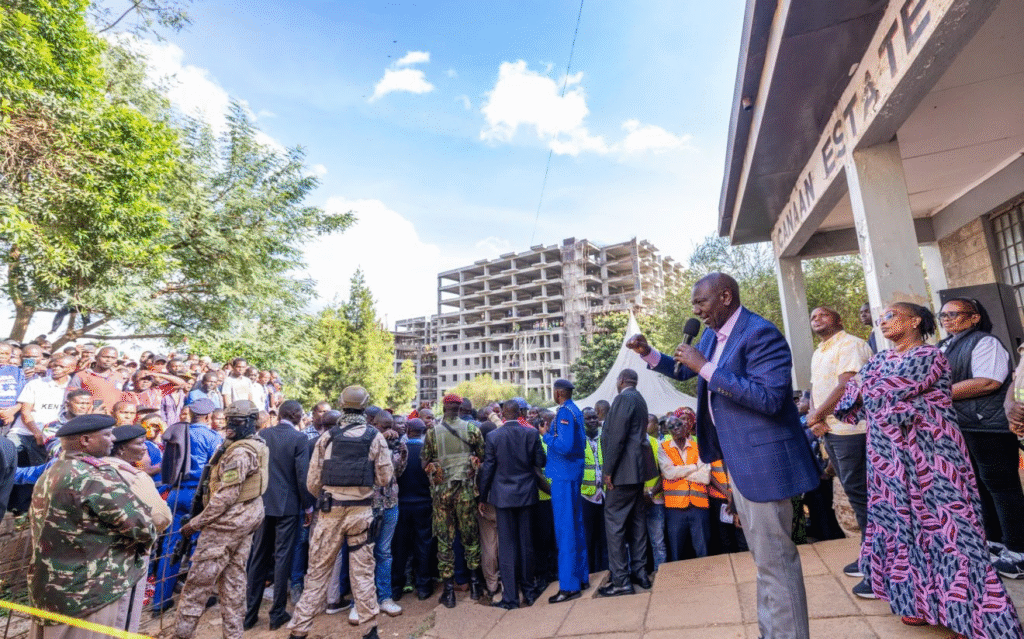Kenya real estate politics is a powerful force that shapes who owns land, where homes are built, and how property values rise or fall. From presidential housing agendas to land allocation scandals, real estate in Kenya is deeply intertwined with power, policy, and public trust.
In 2025, real estate is not just a market—it’s a political battlefield where urban planning, corruption, and social equity collide.
1. The Affordable Housing Program (AHP) – A Political Priority in Kenya
Launched under the Big Four Agenda, the Affordable Housing Program (AHP) is one of the most politically significant real estate initiatives in Kenya.
- Goal: Deliver 500,000 affordable homes by 2027
- Partners: National Housing Corporation (NHC), banks, private developers
- Funding: Public-private partnerships and pension funds
Political Impact:
- Used as a campaign promise in national elections
- Seen as a legacy project for current and past administrations
- Criticized for slow rollout and elite capture (some units sold to high-income buyers)
👉 Reality: While it has delivered over 12,000 units by 2025, delays and bureaucracy have limited its reach.

2. Land Allocation & “Land Grabbing” Scandals
Land remains one of the most politically sensitive issues in Kenya. High-profile cases of illegal allocation, title fraud, and public land encroachment often involve:
- County Governors allocating trust land to allies
- Ministry of Lands officials issuing titles without due process
- Politicians acquiring large parcels in Nairobi, Mombasa, and Rift Valley
Notable examples:
- Kasmuel Sita vs. Ministry of Lands (ongoing court case over Ruiru land)
- Ole Lenku’s land audit in Kajiado County
- NYS land scandal (2023) – Youth program plots allegedly sold to cartels
👉 These cases fuel public distrust and highlight weak enforcement of land laws.
3. County Governments & Real Estate Control
County governments now play a major role in real estate through:
- Issuing development permits
- Collecting land rates and service charges
- Approving subdivisions and master plans
But political influence often leads to:
- Favoritism in approvals
- Delayed permits for rival developers
- Inconsistent zoning (e.g., allowing apartments in residential zones)
In counties like Kiambu, Nakuru, and Machakos, real estate growth is tied to local political stability.

4. LAPSSET Corridor – Infrastructure with Political Stakes
The Lamu Port-South Sudan-Ethiopia Transport (LAPSSET) corridor is a geopolitical and economic megaproject with huge real estate implications.
- Impact: Expected to boost property values in Lamu, Isiolo, and Turkana
- Political Angle:
- Used to win votes in northern Kenya
- Accusations of land speculation by politicians before public announcement
- Delays blamed on inter-ministerial rivalry
Now that Phase 1 of Lamu Port is open (2025), land prices have surged—but local communities fear displacement.
5. Housing as a Campaign Tool
Politicians frequently use housing promises to win votes:
- “Free housing for youth”
- “Plots for women and PWDs”
- “Slum upgrading in 100 days”
While some programs deliver (e.g., NHC’s housing units), others are unfunded or abandoned after elections.
👉 Voters are becoming more skeptical—demanding proof of delivery, not just promises.
6. Urban Planning vs. Informal Settlements
Over 50% of Nairobi’s population lives in informal settlements like Kibera, Mathare, and Mukuru. Real estate politics here involves:
- Eviction threats vs. upgrading efforts
- Public land ownership vs. squatter rights
- Private development on contested land
Recent efforts:
- Mukuru Special Planning Area (SPA) – A rare example of inclusive upgrading with community input
- BBI’s proposed housing fund – Died in court but raised awareness
👉 The struggle continues between development and displacement.

7. Political Risks for Investors
Real estate investors must navigate:
- Policy changes after elections
- Land use reversals under new county leadership
- Delays in approvals due to corruption or bureaucracy
- Reputation risk when partnering with politically exposed persons (PEPs)
✅ Smart investors work with licensed advocates, ISK agents, and transparent developers to reduce exposure.
FAQs
Q: How does politics affect real estate in Kenya?
A: Politics influences land allocation, housing policy, infrastructure projects, and zoning laws—all of which impact property values and investment safety.
Q: Is the Affordable Housing Program political?
A: Yes—it was launched as a presidential agenda item, used in campaigns, and funded through political will. Its success depends on sustained government support.
Q: Can politicians block my real estate project?
A: Not directly, but county officials influenced by politics can delay permits, inspections, or approvals—especially if you’re not “connected.”
Q: Should I avoid real estate in politically sensitive areas?
A: Not necessarily—but do extra due diligence in areas with land disputes, trust land, or upcoming elections.
Final Word
Kenya real estate politics is unavoidable. Whether you’re a buyer, investor, or developer, understanding the intersection of power, policy, and land is essential for protecting your investment and making informed decisions.


